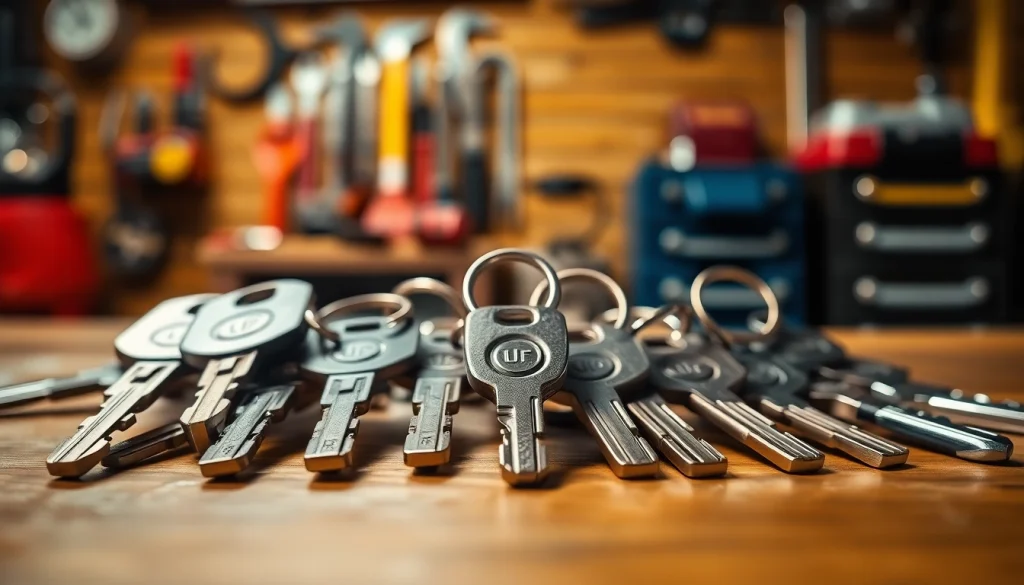
Understanding Truck Keys
When it comes to the operation and security of heavy vehicles, understanding Truck Keys is essential. These keys not only start the engine but also play a critical role in securing the investment made in a truck. As technology has evolved, so too have the keys that operate these powerful machines. Whether you are a truck owner, a fleet manager, or someone interested in automotive technology, gaining insight into truck keys is invaluable.
What are Truck Keys?
Truck keys are specially designed ignition keys that are used to start and secure a variety of trucks, from light-duty pickups to heavy-duty commercial vehicles. Unlike traditional car keys, truck keys can be more complex, often featuring transponder technology or key fobs that integrate with sophisticated vehicle security systems.
These keys come in various forms:
- Standard Keys: Basic mechanical keys that operate the lock and ignition.
- Transponder Keys: Keys with embedded chips that communicate with the truck’s computer system to unlock and start the vehicle.
- Key Fobs: Remote control devices that can unlock doors, open tailgates, and sometimes even start the engine remotely.
- Smart Keys: High-tech keys that allow for passive entry and start, using proximity detectors.
Common Types of Truck Keys
The diversity of trucks on the road necessitates distinct key types, including:
- Heavy-Duty Keys: Designed for large semi-trucks, often requiring specialized cutting and programming.
- Light-Duty Keys: Standard keys found in personal trucks, often similar to car keys.
- Lock-and-Key Sets: Used for securing compartments and toolboxes in trucks.
How Truck Keys Function
Truck keys operate through various mechanisms depending on their design. Mechanical keys work by physically fitting into a lock to turn and initiate the ignition. Transponder keys, on the other hand, utilize a small chip inserted in the plastic head of the key. This chip transmits a signal to the truck’s onboard computer, allowing the vehicle to start only if it recognizes the coded signal.
Key fobs and smart keys provide even further convenience, enabling actions such as remote starting, unlocking doors, and accessing the truck without removing keys from your pocket. These innovative technologies increase security and ease of use, making them popular among truck manufacturers.
Challenges with Truck Keys
Despite their essential role, truck keys are often subjected to unique challenges. Understanding these issues can help truck owners and operators maintain control over their vehicles and avoid costly disruptions.
Common Issues with Truck Keys
Truck keys can encounter a variety of problems, which may include:
- Lost Keys: A very frustrating experience that requires immediate replacement to regain access to the vehicle.
- Broken Keys: Damaged keys can be difficult to use and may render the ignition inoperable.
- Programming Failures: Issues with the key’s transponder chip can prevent a truck from starting, often requiring reprogramming by a professional.
- Wear and Tear: Over time, keys can become worn, making them less effective at opening locks or turning ignitions.
Signs You Need a Replacement Truck Key
Being proactive is key when dealing with truck keys. Look for these signs that indicate a replacement may be necessary:
- Difficulty inserting the key into the ignition.
- Intermittent failures when trying to start the truck.
- Inability to unlock doors or compartments.
- Visible physical damage to the key itself.
Understanding Key Codes for Truck Keys
Every truck key has a unique key code that corresponds to the vehicle’s locking mechanisms. Understanding how to locate this key code can be crucial for obtaining replacements. Usually, this information can be found within the truck’s manual or by contacting the dealership. Knowing your truck’s key code ensures you can get an accurate replacement without unnecessary delays.
How to Replace Truck Keys
When it comes to the replacement of truck keys, a systematic approach is vital. Following established steps can help ensure a smooth process.
Steps for Replacing Your Truck Key
Here’s a comprehensive guide when you find yourself needing a replacement for your truck key:
- Determine the type of key you need (standard, transponder, fob, etc.).
- Locate the key code if applicable.
- Visit a trusted locksmith or dealership for specialized help.
- Provide identification and ownership proof.
- Have the new key cut and programmed accordingly.
Tools Needed for Truck Key Replacement
If you choose to attempt key replacement yourself, be aware that specialized tools may be necessary, such as:
- Key cutting machine for making duplicates.
- Diagnostic tools for programming electronic keys.
- Lubricants for maintaining locks.
Costs Associated with Truck Key Replacement
Understanding the costs involved is essential for budgeting. Replacement costs can vary greatly based on the type of key:
- Standard keys may cost between $5 to $15.
- Transponder keys typically range from $50 to $150.
- Smart keys and key fobs can range from $100 to $400.
Additionally, you may incur service fees if you require a locksmith or dealer assistance, impacting the overall expense.
Where to Get Truck Keys
Knowing where to secure replacements for Truck Keys is as important as understanding their functionality. Finding reliable sources can save time, effort, and money.
Local Options for Truck Key Replacement
Numerous local options exist for getting truck keys replaced, including:
- Locksmiths: Many offer specialized services for vehicle keys with professional key-cutting and programming.
- Dealerships: Your vehicle’s manufacturer can provide exact replacements, often at premium prices.
- Automotive Parts Stores: Some stores offer key duplication services, particularly for standard keys.
Online Resources for Truck Keys
The internet provides various avenues for finding replacement keys or key services. Resources may include:
- Online retailers for key blanks.
- Mobile locksmith services that can come to your location.
- Key programming devices available for DIY enthusiasts.
Choosing a Reliable Key Replacement Service
When selecting a replacement service, rigorous vetting can ensure you get quality. Key factors to consider include:
- Look for certified professionals with positive customer reviews.
- Request quotes and compare prices before settling on a service provider.
- Ensure they have the necessary equipment and expertise for your particular type of truck key.
Maintaining Your Truck Keys
Proper maintenance of truck keys can prolong their lifespan and functionality. Here are some practical tips to follow:
Best Practices for Caring for Truck Keys
To maintain optimal performance, consider these best practices:
- Keep keys clean and free from debris.
- Store keys in a designated area to prevent loss.
- Avoid exposing keys to extreme temperatures or moisture.
- Regularly check for wear and tear, and replace when needed.
When to Seek Professional Help for Truck Keys
There are certain situations where professional assistance is the best route:
- Complex replacement scenarios, such as lost transponder keys.
- Cloudy or non-responsive key fobs.
- Difficulties programming new keys to the vehicle.
Future Trends in Truck Keys Technology
The future of truck keys will likely see further advancements in technology. Some trends to anticipate include:
- Increased Use of Biometric Access: Expect more vehicles to enable access through biometric technologies like fingerprints or face recognition.
- Integration with Apps: Mobile apps that control various functions of the vehicle will become commonplace.
- Enhanced Tracking Features: Future keys may incorporate GPS or location tracking capabilities to prevent theft.






